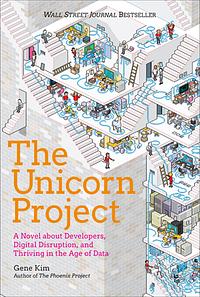Take a photo of a barcode or cover
122 reviews for:
The Unicorn Project: A Novel about Developers, Digital Disruption, and Thriving in the Age of Data
Gene Kim
122 reviews for:
The Unicorn Project: A Novel about Developers, Digital Disruption, and Thriving in the Age of Data
Gene Kim
Is this not every developer's wet dream? A little hard to believe such a transformation could happen so fast, but definitely still an ideal to target and fun to read about. Hearing about the forced go-live deadlines was more horrific and dread-inducing than many a more fantastical novel I've read.
Long and some parts were not holding my attention, but it's a good workplace conversation starter.
Successor tot he Phoenix project. This is an updated perspective from the developers and engineers this time instead of infrastructure and operations. Borrowing heavily on the format the Goal used for theory of constraints, Gene and team have done a great job turning these topics into a novel you can really sink your teeth into.
Fast paced easy read, a bit buzz wordy but like the Phoenix project worth the time spent reading
Not as good as Project Phoenix but still really worth reading by anyone in the industry. The Unicorn Project focuses more on development practices than management. What I really dislike - the book shows working during weekends and over hours as something normal and well-desired behaviour while it should be shown as one of the industry diseases.
informative
inspiring
reflective
medium-paced
Plot or Character Driven:
A mix
Strong character development:
Yes
Loveable characters:
Complicated
Diverse cast of characters:
No
Flaws of characters a main focus:
No
I've enjoyed my experience with this title. For 2019, this surely was a future thinking book, and for many trends, we've seen them unfolding, even with a pandemic currently continuing its disruption. Yet, there are many aspects that I'm seeing still being ignored. Companies instead of investing in psychological safety, are instead heavily invested in psychological torment for short term gains. Overall, I'm not a professional reviewer, so I'll leave thr criticisms to them.
I'm surprised I actually enjoyed this book as much as I did. The Phoenix Project seemed like a huge ripoff of The Goal, which I read for an operations class. Since I'm a few years removed from my MBA program and not immersed in business classes, I found The Unicorn Project beyond tolerable. The book seems more like a continuation or companion to The Phoenix Project, however, and not like a Phoenix-Project-for-Big-Data, as I anticipated. The big data portion doesn't really begin in earnest until 2/3 of the way through the book and the details are largely glossed over. This wasn't an issue for me, as I wasn't viewing this book from a data scientist's perspective. However, I'm not sure I would eagerly recommend this book to someone coming from a data science background.
While definitely second-rate fiction, The Unicorn Project is a much better read than most software- and tech-related nonfiction. I recommend it for people who work in or around software development and who want to learn some solid high-level concepts for improving development processes, particularly on the team and organization levels---even more so if you enjoy fiction more than nonfiction. It's a light read, with some stories and anecdotes that will likely stick with me better than most.
I enjoyed the first half of the book and got pretty annoyed at the second part. While it made sense to me that there could be a small group of smart people who want to change things for good, that they assembled bare minimum infrastructure to do modern software development, even that they got splendid business results for their first project, what I couldn't wrap my head around is how this trend can JUST spread across the organization like everybody is ready for the changes. Sure they encountered some C-level old-school executive's opposition (they even managed to overthrow her in the end!), in reality, no such radical change of processes and mindset can proceed in such a smooth and straightforward way (if so, won't we live in such a dream already?)
The book made everything sound so simple, as long as you have a group of talented individuals. They can see through the current miserable way of working and bring the joy of work with evolutionary ways, they can build full-blown DevOps infrastructures, Data warehouse, reporting systems like overnight, while migrating the entire organization onto these new systems and creating new business strategies, within ... a year! I know how difficult to build these systems right, I wonder how many businesses in reality even get it right, but no matter, these "Rebellions" can get everything done in neck-breaking speed. Towards the end, it read more and more like daydreaming to me and I cannot relate to the story any more.
The book made everything sound so simple, as long as you have a group of talented individuals. They can see through the current miserable way of working and bring the joy of work with evolutionary ways, they can build full-blown DevOps infrastructures, Data warehouse, reporting systems like overnight, while migrating the entire organization onto these new systems and creating new business strategies, within ... a year! I know how difficult to build these systems right, I wonder how many businesses in reality even get it right, but no matter, these "Rebellions" can get everything done in neck-breaking speed. Towards the end, it read more and more like daydreaming to me and I cannot relate to the story any more.



